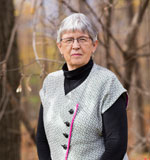If you have built a sizeable estate and also are looking for ways to receive reliable payments, consider a charitable remainder trust.
These types of gifts may offer you tax benefits and the option for income. There are two ways to receive payments and each has its own benefits:
The annuity trust pays you, each year, the same dollar amount you choose at the start. Your payments stay the same, regardless of fluctuations in trust investments.
The unitrust pays you, each year, a variable amount based on a fixed percentage of the fair market value of the trust assets. The amount of your payments is redetermined annually. If the value of the trust increases, so do your payments. If the value decreases, however, so will your payments.


 “I want to see cancer be a thing of the past. Until it is, I want to do all I can to help cancer patients and their families get the best care possible.” Ginny Coolidge
“I want to see cancer be a thing of the past. Until it is, I want to do all I can to help cancer patients and their families get the best care possible.” Ginny Coolidge